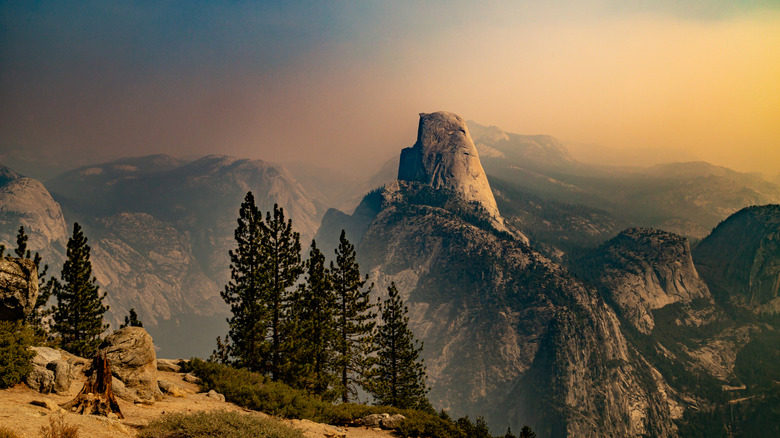The Surprising Reason Why You Should Avoid Cursing At A National Park
There are loads of reasons why you might blurt out a curse at a national park. You stub your toe, get lost, lose cell service, see a bear (or Bigfoot), realize you forgot your protein bar, hurry to a tree for a last-minute second pee, etc. Really, curse words are a magnificent element of language, versatile enough to be applied to any expression of explosive emotion, anytime. Unless you're in a U.S. national park, that is. There, you'd better zip it or the morality police will zoom out of the sky and waggle their finger at you. Okay, that won't happen, but cursing still might be considered disorderly conduct under the Code of Federal Regulations, Title 36, § 2.34.
To be fair, there's nothing in 36 CFR § 2.34 that talks about "curse words," specifically. Worth quoting for clarity's sake, disorderly conduct involves a park goer who uses "language, an utterance, or gesture, or engages in a display or act that is obscene, physically threatening or menacing," particularly if it's likely to lead to violence or a "breach of the peace." The statute also includes actual, physical violence, causing a ruckus considered "unreasonable" given the context, or someone having a "physically offensive condition," which might mean a stinky camper who hasn't showered in a week — we're not sure.
So, basically, the statute includes a bunch of common sense and a splash of social niceties that we all should have learned in grade school. While it's unlikely that a park ranger will be there to hear you cursing up a storm if you're in a vast national park like Yosemite hiking one of its ultra-dangerous treks, committing disorderly conduct does come with actual consequences. You will be required to pay a fine of $100, plus all legal costs incurred.
Keeping a cool head in the great outdoors
It's ironic, right? Lots of people go to national parks and the great outdoors as a whole to clear their heads, rebalance, and get away from the hustle and bustle. The easy-going trails of Catherine Creek State Park in Oregon, for instance, are good for this. Others go because they want exertion or a mountain climbing challenge up a high peak like Alaska's Mt. McKinley (formerly Denali). But even those activities exist, implicitly or otherwise, to redress mental health. It'd be a shame to go to one of America's many, many national parks — 433 parks covering 85 million acres – only to be caught up in someone else's disorderly conduct or be the source of disorderly conduct oneself. Then again, some folks just like cursing because it's fun, not because they're about to violate the U.S. Code of Federal Regulations, Title 36, § 2.34.
So rather than thinking of 36 CFR § 2.34 as a wholly punitive measure meant to filch $100 from you and violate your personal autonomy, you could think of it as a reminder to get the most out of your trip by keeping a cool head. There's little you can do about a stubbed toe except let the pain fade. There's all sorts of psychological techniques you can use to channel your frustration or the desire to curse elsewhere, like focusing your attention on a specific sense (smell, sound, etc.), pausing the hike to breathe and jot down something on paper (not your phone), or repeating to yourself some mantra, like, "Hey, you need that $100, don't you?" And even if you go to state parks in the U.S., you'll still have to contend with pretty much the same disorderly conduct rules.

